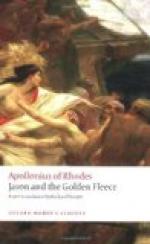Thus he spake, making trial of the chiefs; but they shouted loud with cheerful words. And his heart was warmed within him at their cry and again he spake outright among them: “My friends, in your valour my courage is quickened. Wherefore now, even though I should take my way through the gulfs of Hades, no more shall I let fear seize upon me, since ye are steadfast amid cruel terrors. But now that we have sailed out from the striking rocks, I trow that never hereafter will there be another such fearful thing, if indeed we go on our way following the counsel of Phineus.”
Thus he spake, and straightway they ceased from such words and gave unwearying labour to the oar; and quickly they passed by the swiftly flowing river Rhebas and the peak of Colone, and soon thereafter the black headland, and near it the mouth of the river Phyllis, where aforetime Dipsacus received in his home the son of Athamas, when with his ram he was flying from the city of Orchomenus; and Dipsacus was the son of a meadow-nymph, nor was insolence his delight, but contented by his father’s stream he dwelt with his mother, pasturing his flocks by the shore. And quickly they sighted and sailed past his shrine and the broad banks of the river and the plain, and deep-flowing Calpe, and all the windless night and the day they bent to their tireless oars. And even as ploughing oxen toil as they cleave the moist earth, and sweat streams in abundance from flank and neck; and from beneath the yoke their eyes roll askance, while the breath ever rushes from their mouths in hot gasps; and all day long they toil, planting their hoofs deep in the ground; like them the heroes kept dragging their oars through the sea.
Now when divine light has not yet come nor is it utter darkness, but a faint glimmer has spread over the night, the time when men wake and call it twilight, at that hour they ran into the harbour of the desert island Thynias and, spent by weary toil, mounted the shore. And to them the son of Leto, as he passed from Lycia far away to the countless folk of the Hyperboreans, appeared; and about his cheeks on both sides his golden locks flowed in clusters as he moved; in his left hand he held a silver bow, and on his back was slung a quiver hanging from his shoulders; and beneath his feet all the island quaked, and the waves surged high on the beach. Helpless amazement seized them as they looked; and no one dared to gaze face to face into the fair eyes of the god. And they stood with heads bowed to the ground; but he, far off, passed on to the sea through the air; and at length Orpheus spake as follows, addressing the chiefs:
“Come, let us call this island the sacred isle of Apollo of the Dawn since he has appeared to all, passing by at dawn; and we will offer such sacrifices as we can, building an altar on the shore; and if hereafter he shall grant us a safe return to the Haemonian land, then will we lay on his altar the thighs of horned goats. And now I bid you propitiate him with the steam of sacrifice and libations. Be gracious, O king, be gracious in thy appearing.”




